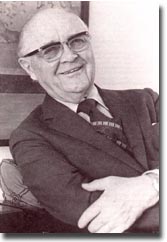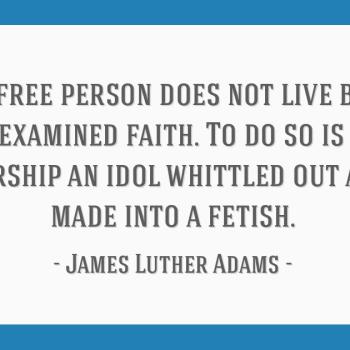(I wrote this last year. I’m reposting today in honor of the occasion, the Reverend Doctor James Luther Adams birthday…)
What is now many years ago when Jan & I first moved to New England’s rocky and lovely soil, Jan wanted to go to the Cambridge cemetery to put a rose on Henry James’ grave. I was more than happy to join her as I wanted to put a flower on William’s grave.
After consulting some guides we bought a small bouquet of roses and drove out to the cemetery which turns out to be just east of the more famous Mt Auburn cemetery. And we had almost difficulty finding the James family site. As we set single roses down for each Henry & William, I was glad we had extras, as everyone tells me their sister Alice was the smart one in the family. And she definitely deserved a flower of her own.
Then as we stepped back to admire the scene, I turned slightly and saw a large tombstone featuring that most common symbol of Unitarian Universalism, a “flaming chalice.” We walked over and saw it was James Luther Adams‘ grave. I thought this a most wonderful accident. Adams is without a doubt the most significant theologian that Unitarian Universalism produced during the twentieth century.
James Luther Adams was born in Washington state on this day, the 12th of November, in 1901. At first his course was not very clear. He dropped out of school at sixteen to help support his family, going to work for the railroad. But it was clear to all he had more to offer. Encouraged to continue his education he returned to school earning an undergraduate degree at the University of Minnesota. From there he attended Harvard Divinity school, after which he was ordained a Unitarian minister.
In 1937 he began teaching at Meadville Lombard, the Unitarian seminary in Chicago. He spent twenty-one years there, and another eleven at Harvard Divinity School. In “retirement” he continued to teach for a few years at Andover Newton.
His influence was wide, extending beyond Unitarian and later Unitarian Universalist circles, particularly in his exploration of ethics. Adams’ spiritual journey took him from Christian fundamentalism, to a rationalist humanism, and finally to liberal Christianity. From that vantage he became one of the foremost exponents of liberal Christianity, a spirituality informed by the twin currents of the Christian tradition and the rationalist spirit that began in the Eighteenth century Enlightenment.
What I find particularly important was Adam’s lover’s critique of liberal Christianity and indeed liberal religion’s sometimes too easy optimism. Adams spent several years studying in Germany in the years running up to the Second World War and there he met Nazi “German Christians” as well as leaders of the “Confessing Church” resistance. He was deeply concerned with the vulnerabilities of the liberal church when confronted with such stark dangers.
Something we children of the west, informed as we are by the currents of rationality and its bone deep optimism in human possibility, whether we are conscious of it or not, of whatever spiritual tradition we might be, can, I believe all profit from knowing a little more about. As a small aside, if you’re interested a good introduction to Adams’ work, I recommend George Kimmich Beach’s Transforming Liberalism. (Here is a good review)
So. And. When Jan and I were there standing in front of his grave, we laid the rest of our roses there.
I remain grateful for his work.
His heart. And, his mind.
And most of all his great reminder that we do not walk alone…












